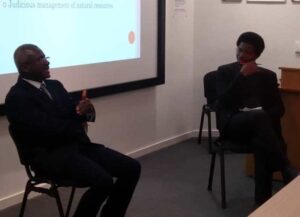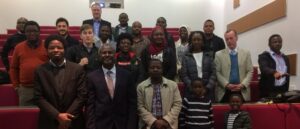2018 INTERNATIONAL DAY OF PEACE TALK
 The event commenced, shortly after the general introduction, with the video message (http://www.un.org/en/events/peaceday/) of His Excellency, Antonio Guterres, the Secretary-General of the United Nations on the Peace Day and followed by a special talk which reflected on the lessons drawn from the peaceful transition of power following the 2017 Presidential Election in the Gambia. Our Guest speaker was Dr Alhagi Drammeh, Associate Professor of Islamic Studies at the Al-Maktoum College of Higher Education, Scotland. Dr Drammeh spoke on Democracy and Security in the Post Yahya Jammeh Governance in the Gambia. He gave an overview of the Gambia’s political history and explained how Yahya Jammeh came into power in 1994 through a successful coup on the pretext to work for the Gambian masses. According to the speaker, it was unfortunate that Yahya Jammeh changed when he tasted power. He was able to sustain his grip to power for more than two decades as an authoritarian ruler in the small state of West Africa with various human rights abuses. The 2017 Gambian presidential election was seen as a testimony to the frustration of the Gambian masses against Jammeh’s authoritarian posture. In the face of creating imminent political chaos that would have led to a humanitarian crisis in the West African sub-region, the Gambian people, with the regional and international support, remained resolute and ensured that Yahya Jammeh handed over power to the winner of the election, His Excellency, Adama Barrow. The speaker was more positive about the new administration, believing that President Adama Barrow has been working to turn the Gambia around by developing new partnerships with local, regional and international actors in reforming the governance institutions of the country in order to serve the needs of the people. Even though, it may be too early to judge the performance of the new political leadership in the Gambia, the notable message about the talk was the peaceful transition borne out of concerted efforts of multiple actors from the popular will of the citizens, the consistent advocacy of civil society, the role of ECOWAS Mission in the Gambia (ECOMIG), the Support of the European Union and other international actors who were involved throughout the transition period.
The event commenced, shortly after the general introduction, with the video message (http://www.un.org/en/events/peaceday/) of His Excellency, Antonio Guterres, the Secretary-General of the United Nations on the Peace Day and followed by a special talk which reflected on the lessons drawn from the peaceful transition of power following the 2017 Presidential Election in the Gambia. Our Guest speaker was Dr Alhagi Drammeh, Associate Professor of Islamic Studies at the Al-Maktoum College of Higher Education, Scotland. Dr Drammeh spoke on Democracy and Security in the Post Yahya Jammeh Governance in the Gambia. He gave an overview of the Gambia’s political history and explained how Yahya Jammeh came into power in 1994 through a successful coup on the pretext to work for the Gambian masses. According to the speaker, it was unfortunate that Yahya Jammeh changed when he tasted power. He was able to sustain his grip to power for more than two decades as an authoritarian ruler in the small state of West Africa with various human rights abuses. The 2017 Gambian presidential election was seen as a testimony to the frustration of the Gambian masses against Jammeh’s authoritarian posture. In the face of creating imminent political chaos that would have led to a humanitarian crisis in the West African sub-region, the Gambian people, with the regional and international support, remained resolute and ensured that Yahya Jammeh handed over power to the winner of the election, His Excellency, Adama Barrow. The speaker was more positive about the new administration, believing that President Adama Barrow has been working to turn the Gambia around by developing new partnerships with local, regional and international actors in reforming the governance institutions of the country in order to serve the needs of the people. Even though, it may be too early to judge the performance of the new political leadership in the Gambia, the notable message about the talk was the peaceful transition borne out of concerted efforts of multiple actors from the popular will of the citizens, the consistent advocacy of civil society, the role of ECOWAS Mission in the Gambia (ECOMIG), the Support of the European Union and other international actors who were involved throughout the transition period.
Thank you,



